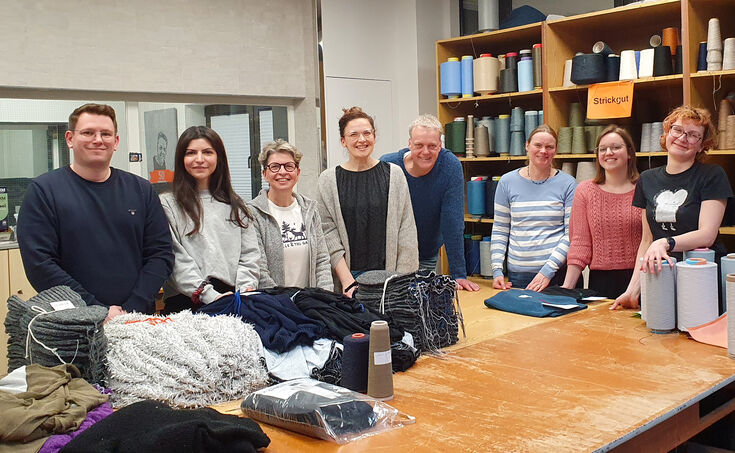87 percent of global textile waste in the clothing industry ends up in landfills or is incinerated. Of the 13 percent that is still mechanically processed, most used textiles end up as insulation material (downcycling). Not even one percent is processed into high-quality fibers that can be used to make new clothing.
The Hochschule Niederrhein (HSNR) urgently wants to change this situation. Together with Bache Innovative as the applicant, it has launched a major research project: "KnitCycle - circular product development for flat knit textiles". The German Federal Environmental Foundation (DBU) is sponsoring the project for two years with a total of around 290,000 euros, of which 225,000 euros will go to HSNR.
Where textile waste can be recycled and thus fed back into the cycle, less waste has to be disposed of. If production waste and surpluses are destroyed, this is not only expensive for the companies. Completely new fibers have to be produced again for the manufacture of new clothing. Depending on the fibre material, this results in high water consumption, heavy use of pesticides and fertilizers and long transport routes with highCO2 emissions at the expense of the environment.
The project partners are therefore developing a concept with which knitted products can be developed in such a way that they can be reprocessed into high-quality fibers at the end of their product life through fiber-to-fiber recycling. These fibers can then be used to produce new, industrially processable yarn for clothing, which can ideally be recycled again later.
Under the motto "Design for Recycling", the partners are analyzing which factors and processes are best suited to designing textiles during their creation in such a way that they are optimally recyclable at the end of the product's life. At the same time, the aesthetics, quality and durability of the products must not deteriorate. So the question is: what parameters are required in mechanical recycling and what product properties achieve the best recyclable result?
" KnitCycle" focuses on sweaters and products that are produced on flat knitting machines in Germany in the correct final shape. The company Bache Innovative, which specializes in 3D knitwear, supplies and produces its own waste and research material for this purpose. Support with expert know-how is also provided by TURNS Faserkreisläufe. This company produces recycled yarns from various used, discarded textiles.
The fiber-to-fiber recycling tests take place at the university's own Research Institute for Textile and Clothing (FTB). The HSNR is using the funding to purchase its own tearing machine for textile recycling. This will be used to determine the optimum process parameters for recycling the respective product types on site. The torn fibers obtained in this process are then analyzed and evaluated with the support of the company Textechno H. Stein GmbH & Co KG from Mönchengladbach, among others.
New yarns are then produced from the tensile fibers using various processing and spinning methods. The researchers are testing how the fibers can be re-spun - also in combination with other natural fibers - in order to close the product cycle with new products of the highest possible quality. The FTB team produces initial 2D knitting samples on laboratory knitting machines. The final knitted products are made from the recycled yarns by cooperation partner Bache Innovative.
"In the future, we will learn that there are actually no waste materials, only recyclable materials that are put to other uses and serve as new resources for the future," says Ellen Bendt, HSNR professor of fashion design with a specialization in knitwear and innovative product design.
















